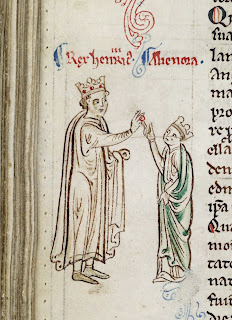[For earlier history, see
here.]
Finding the origin of nursery rhymes can be unreliable, since one never knows how long a rhyme was circulating orally until it got recorded. See my comments on "Ring Around the Rosie"
here. Also, what we think of as the nursery rhyme may be just the latest version; earlier versions may lead to entirely different interpretations. The full
current version of "London Bridge Is Falling Down" can be read
here. It has references that make it very unlikely to be a medieval poem.
 |
| Viking boat pulling down London Bridge |
The earliest reference to something that might be related to the Bridge rhyme is found in the Norse
Heimskringla, written in Iceland by Snorri Sturluson (1178-1241). In it, Sturluson collected stories of Norwegian kings. In one story, King Olaf II attacked London and the Bridge in the company of the Saxon King Æthelred the Unready. They pulled it down with chains, dividing the Danish forces who had no other easy way to cross the Thames. The 1844 English edition included a poem by another poet, Ottar Svarti ("Ottar the Black"), which begins with the line "London Bridge is broken down." It was discovered later, however, that the translator decided to prefix Ottar's poem with a made-up line. Ottar never referred to London Bridge.
In the 1890s, another theory as to the origin came from a British folklorist. Drawing on an old theme of blood sacrifice to make foundations strong, she suggested that children were buried—perhaps alive—under the Bridge. Actually, there
was a burial "under" the Bridge. Peter de Colechurch, who was heavily involved in the construction of the 12th century version, was a chaplain of the church in which St. Thomas Becket was baptized. He had a chapel on the Bridge dedicated to Becket. de Colechurch died in 1205 and was buried in the crypt, at the river level of the chapel. At the dismantling of the Bridge in 1832, when his bones were found, they were unceremoniously tossed into the Thames.
 |
| Wedding of Henry III & Eleanor of Provence |
Then there's the story that Eleanor of Provence (c.1223-1291), who was given the tolls and rents from the Bridge as a present from her husband, Henry III, spent them on herself rather than the upkeep of the Bridge. The Bridge fell into disrepair, and a derisive verse was formed with the telling, sarcastic phrase "my fair lady."
Control of the Bridge was returned to the City of London in 1281. Ironically, the heavy river ice that winter built up against the bridge and five of the arches collapsed.
The Bridge has become iconic. A few remaining stones of the medieval version can be seen in the churchyard of St. Magnus Martyr, which used to be at one end of the span. In the early 1960s, when he learned London wanted to replace the Bridge and offered to sell the Victorian version, American chainsaw magnate Robert McCulloch offered the winning bid of $2,460,000. McCulloch transported the stones (carefully coded) to Lake Havasu City, Arizona, USA, where he had them painstakingly re-assembled over a steel structure. "London Bridge" now exists on both sides of the Atlantic!









